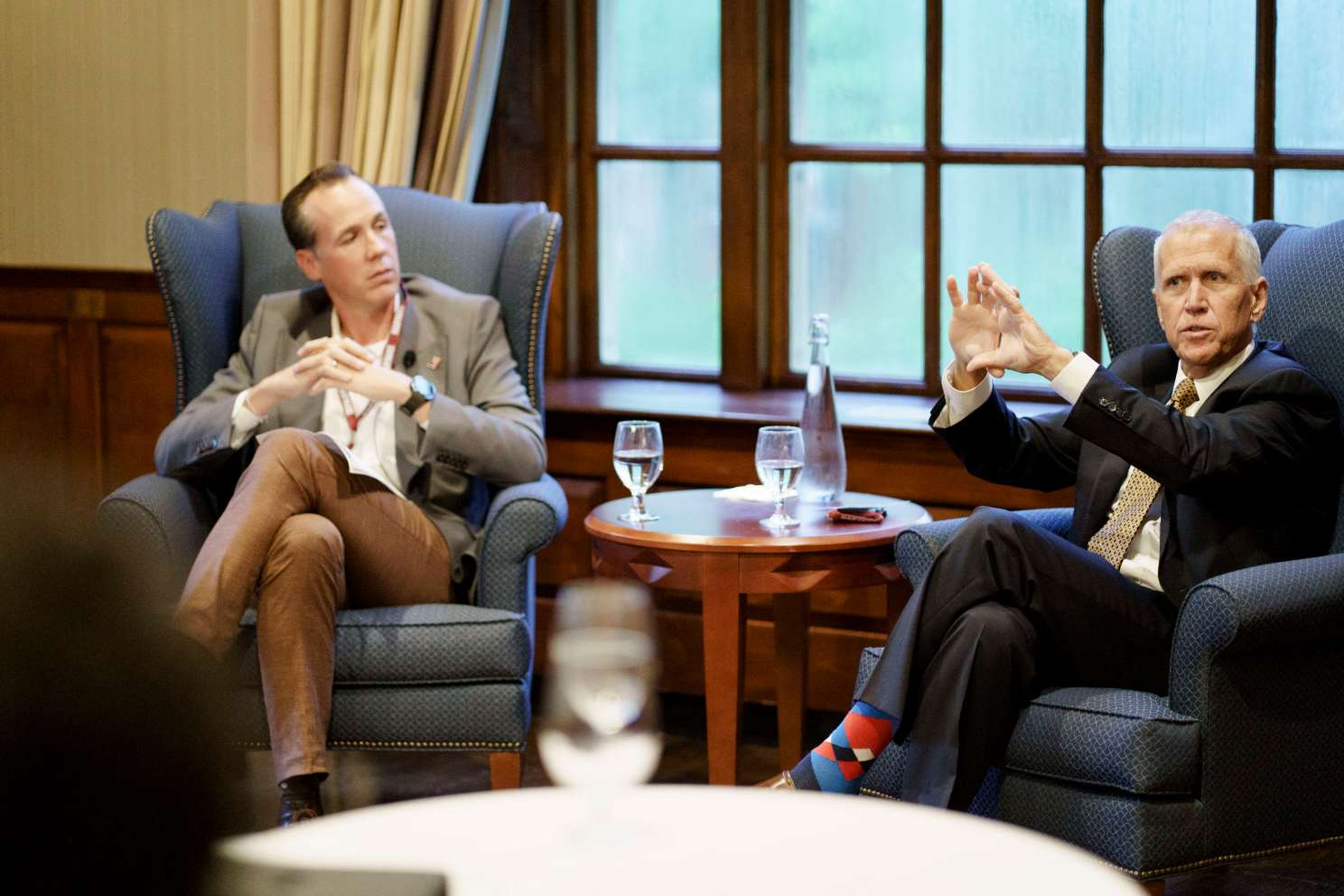‘Vibes or hunches’ don’t help win elections
‘Vibes or hunches’ don’t help win elections

Political analytics conference convenes experts on voter trends, election forecasting, behavioral research
How should politicians proceed when gut instinct clashes with data analytics?
“You go with the analytics,” said North Carolina Sen. Thom Tillis.
The second-term Republican was on campus last week to help kick off Political Analytics 2025. Organized by the Center for American Political Studies, the one-day conference convened top thinkers on voter trends, election forecasting, and behavioral research. Tillis, a former executive with PricewaterhouseCoopers and IBM, credited an opinion poll with vaulting his legislative career.
He remembered facing a supposedly indominable incumbent in the 2006 Republican primary for a seat in the North Carolina House of Representatives. “I engaged someone to do a poll to determine whether or not the guy could be beaten — where his vulnerability was,” Tillis said. “We went from going after a guy who was supposedly unbeatable to beating him by a two-to-one margin.”
In the audience were pollsters, consultants, and political scientists with expertise in big data. “Politics deserves every bit of sophistication we can bring to it,” said host Ryan D. Enos, a professor of government and director of the Center for American Political Studies. “We can’t leave it to vibes or hunches any more than we can leave medicine to those things.”
Panelists referred to challenges in today’s rapidly changing political environment, including diminished confidence in institutions and a splintering information ecosystem. “We realize even more the need for an analytical approach to politics,” Enos said. “This is why we revived the Harvard Political Analytics Conference after a seven-year hiatus.”
“We realize even more the need for an analytical approach to politics.”
Ryan D. Enos
In one panel, seasoned strategists shared findings from research and field work. David Shor, a data scientist and consultant supporting candidates on the left, pushed back against those who argue Democrats need to run a white man in the next presidential election, noting that his metrics show women candidates often outperform men. Data and behavioral scientist Matt Oczkowski, formerly of Cambridge Analytica, predicted something of a “civil war” on the right, as establishment Republicans fight to win back the party’s soul.
Enos and his co-organizers also assembled a panel to discuss the country’s youngest voters. Rachel Janfaza ’20, founder of the qualitative research firm The Up and Up, outlined her theory of “two Gen Zs,” separated by the pandemic’s disruption of K-12 education. Also highlighted were concerns about AI’s job market impacts and an emerging gender divide on marriage and children.
Multiple panelists grappled with the state of political polling, with support for President Trump underestimated in three consecutive cycles. They discussed whether artificial intelligence could help pollsters reach more independent and Republican voters or if interviewers should try doubling down on in-person methods.

Polling before last year’s general election was still more accurate than historic averages, noted CNN chief data analyst Harry Enten. “The problem is,” he said, “we have had more elections in a row, at least in the popular vote, that were determined by single digits than at any point since we first started recording the popular vote in 1824.”
Presented as a possible counterweight were predictions markets, or online platforms where users can wager on the outcomes of future events. Jaron Zhou ’22 of the predictions market Kalshi noted traders on his site decisively split for President Trump last fall. The Q&A session saw conference-goers raising concerns, including the danger of further eroding trust in noncommercial, nonpartisan political polls.
The Hispanic vote proved another lightning rod, with multiple panelists drawing on the 2024 election for evidence of historic realignment. “I wouldn’t be surprised if in 2026, just because of the general nature of midterm elections, you see a lot of the gains Republicans made with Hispanic voters slide back,” said NBC News chief data analyst Steve Kornacki.
But he likened it to the 1986 midterms, when Democrats flipped Senate seats in Alabama, Georgia, and North Carolina. It hardly heralded the party’s resurgence in the South, Kornacki recalled. “It was a blip.”
He suggested factors including race, gender, and age were already driving more lasting change. “Trends that we’ve seen with white voters are starting to take hold among non-white voters,” Kornacki said, “but specifically, and I think most dramatically and most immediately, with Hispanic voters.”
Latest Harvard
- Time for mandatory retirement ages for lawmakers, judges, presidents?Americans seem to mostly say yes; legal, medical scholars point to complexities of setting limits
- In dogs, as in humans, a harsh past might bare its teethEarly adversity leads to higher aggression and fearfulness in adult canines, study says
- Brief bursts of wisdomAphorism lover and historian James Geary reflects on how ancient literary art form fits into age of social media
- Flew home as Will Flintoft, returned as Rhodes ScholarApplied math concentrator to study computer science, theology with eye toward AI
- What will AI mean for humanity?Scholars from range of disciplines see red flags, possibilities ahead
- Tai Tsun Wu, 90Memorial Minute — Faculty of Arts and Sciences






